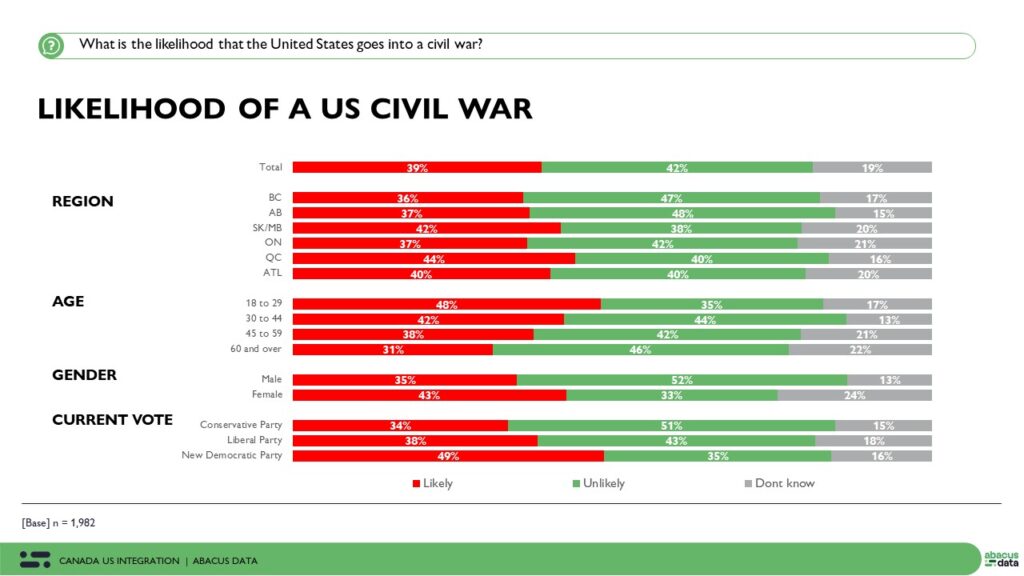Civil war in the US? And, is there an age when political leadership should step aside?
Everything is political, eh? I think so, and that’s why I’m excited to share news of a new partnership between Abacus Data and GZERO Media. GZERO Media is a company dedicated to providing the public with intelligent and engaging coverage of global affairs. It was created in 2017 as a subsidiary of Eurasia Group, the world’s leading political risk analysis firm.
Over the next 100 days and beyond, we will be partnering with GZERO Media and it’s flagship GZERO North newsletter to ask Canadians and Americans interesting, different, and at times uncoventional questions about the Canada-US relationship, American politics, the US election, and global affairs.
Today, we released some new polling from a national survey of 2,000 Canadian adults from July 16 to 21, 2024.
In that survey, we asked three specific questions:
1: What is the likelihood that the United States goes into a civil war?
2: Do you think there should be a maximum age for someone who is Prime Minister or President?
3: (if yes) What do you think that age limit should be?
Here’s what we found:
Is American heading towards a civil war?
A sizeable portion of Canadians think its at least somewhat likely that the United States will go into a civil war. 4 in 10 Canadians think it’s at least somewhat likely with 12% thinking its very likely. Another 4 in 10 think it’s unlikely to happen while 19% are unsure.

Younger Canadians, women, and those who support the NDP are more likely to think it’s possible the United States will be go into a civil war at some point. Given the deep divisions, polarization, and political violence in the United States, Canadians are watching and many believe the worst could happen.

Is there a best before date for political leaders?
Most Canadians think there is. 7 in 10 Canadians believe there should be a maximum age for someone who is Prime Minister or President. Of those, the average maximum age is around 65 years with almost half believing the age is somewhere between 61 and 70 years of age.

Although there is little political difference of opinion on the age limit for political leadership, there is a sharp generational one. Younger Canadians are more likely to think the maximum age for political leaders should be lower than older Canadians.

THE UPSHOT
Most Canadians think political leaders have a best before date, and the average age of a president or prime minister is around the usual age of retirement – 65.
The whole Joe Biden saga put into clear perspective the effect aging can have on- especially in chief executives – charged with the most important executive functions in a country or the world. It sparked a debate about the capacity of leaders and most think there should be a maximum age in the same way we have a minimum age to be elected or be chief executive.
Beyond the age of political leaders, Canadians are also watching the increasing polarization and political violence in the US and many of them are not shutting the door to that division escalating into full scale civil war.
Younger Canadians in particular are inclined to think that the very worst outcome is at least a possibility.
METHODOLOGY
The survey was conducted with 2,000 Canadian adults from July 16 to 22, 2024. A random sample of panelists were invited to complete the survey from a set of partner panels based on the Lucid exchange platform. These partners are typically double opt-in survey panels, blended to manage out potential skews in the data from a single source.
The margin of error for a comparable probability-based random sample of the same size is +/- 2.191%, 19 times out of 20.
The data were weighted according to census data to ensure that the sample matched Canada’s population according to age, gender, educational attainment, and region. Totals may not add up to 100 due to rounding.
This survey was paid for by Abacus Data Inc.
Abacus Data follows the CRIC Public Opinion Research Standards and Disclosure Requirements that can be found here: https://canadianresearchinsightscouncil.ca/standards/
ABOUT ABACUS DATA
We are Canada’s most sought-after, influential, and impactful polling and market research firm. We are hired by many of North America’s most respected and influential brands and organizations.
We use the latest technology, sound science, and deep experience to generate top-flight research-based advice to our clients. We offer global research capacity with a strong focus on customer service, attention to detail, and exceptional value.
And we are growing throughout all parts of Canada and the United States and have capacity for new clients who want high quality research insights with enlightened hospitality.
Our record speaks for itself: we were one of the most accurate pollsters conducting research during the 2021 Canadian election following up on our outstanding record in the 2019, 2015, and 2011 federal elections.
Contact us with any questions.
Find out more about how we can help your organization by downloading our corporate profile and service offering.
